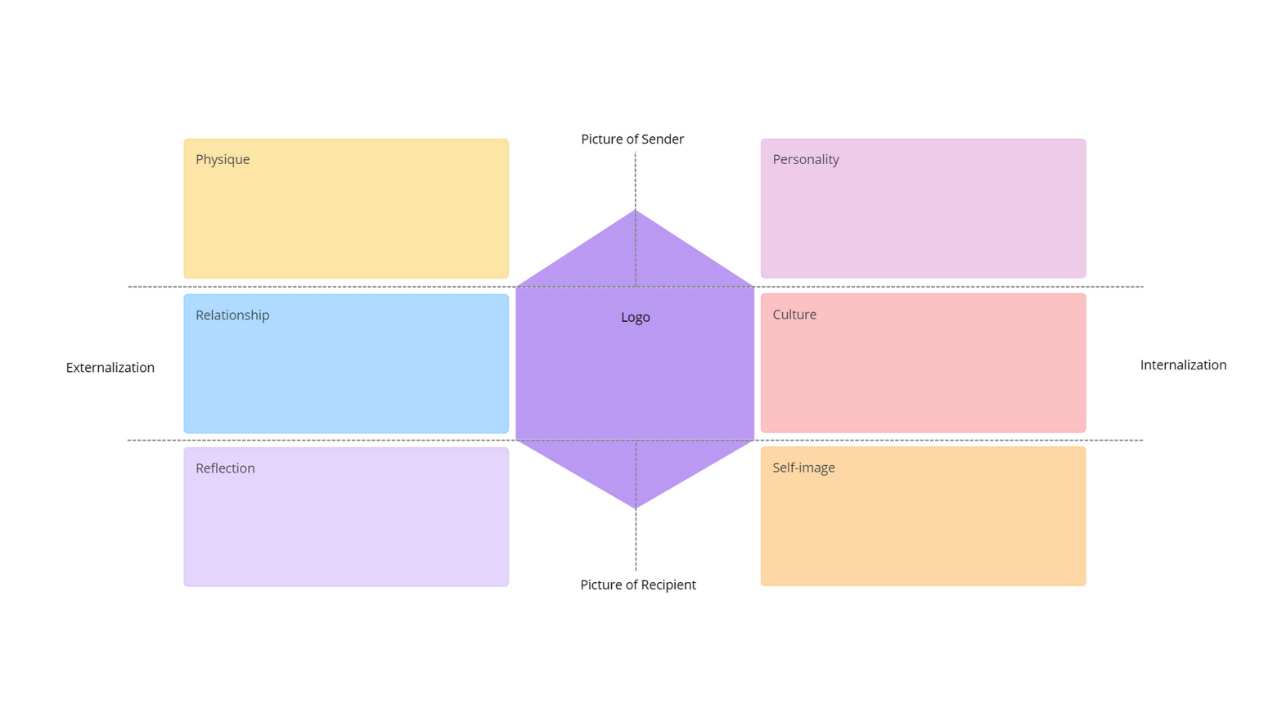Brand Identity Prism Template

Develop a clear brand identity that will help you deliver the right messages to your audience with Ayoa’s Brand Identity Prism template.
What is the Kapferer Brand Identity Prism?
Having a clear brand identity is essential for every business as it will shape everything you do – from how your logo looks, to the language you use when you reach out to the public via various communication channels. Kapferer’s Brand Identity Prism (sometimes also referred to as the Kapferer Prism) is a popular framework that can be used to help you define what your brand is. Created by professor and brand expert, Jean-Noël Kapferer, in 1996, this method encourages you to analyze the various factors that go into building a brand identity, with particular emphasis being placed on the people that matter most – your customers.
Kapferer’s Brand Identity Prism helps you to bring together the tangible (physical) and intangible aspects of your brand’s identity, breaking them down into two key categories: externalization and internalization. To help you conduct a deeper analysis of what your brand represents and why, the Brand Identity Prism is then divided into six further sections; Physique, Personality, Relationship, Culture, Reflection, and Self-image. These elements will be described in more detail in the step-by-step guide below.
Why use the Brand Identity Prism?
Our Brand Identity Prism template is perfect for internal brand managers and marketing teams who are often responsible for building your brand image and shaping how your business appears to the outside world. Everything you do as a company will be underpinned by your brand identity. By having this clearly defined, your communications will be easily recognizable to your customers, and you will be able to develop messages that truly resonate with them and command their attention.
Using our Brand Identity Prism template to clarify exactly what your brand is will also help you to deliver the right messages to your target audience by putting you in the mind of the consumer. If your business’s overarching vision and values are in-line with those held by your target audience, they will be more likely to stay loyal to you.
External branding agencies can also benefit from using this simple framework when tasked with helping a company to rebrand or strengthen their existing brand identity. By filling in the Brand Identity Prism with your clients and sharing it with them, you can ensure that everyone is on the same page at every stage of the project and that you are delivering the results your client wants.
How to use our Brand Identity Prism template
Our Brand Identity Prism template is divided into the sections you need, so you can get started instantly! Find out how to use this template effectively below.
To access the template, sign up to Ayoa. Once you've signed up, navigate to the homepage to create a new whiteboard, mind map or task board and choose this template from the library.
In the middle box of the template, add an image of your company’s logo (if you have one). If you’re rebranding, you can input your existing logo in this box for the time being.
PHYSIQUE. This involves considering all the physical aspects of your brand, such as your logo and brand colors, as well as any fonts, iconography, and shapes you commonly use or (are planning to use) in your branding. Ask yourself, is your brand easily identifiable? Do you stand out from your competitors? Add this information to the box using sticky notes.
PERSONALITY. Look at aspects such as your writing style, tone, and attitude to try to define your brand’s personality traits. Would you describe it as being laid-back or formal? Is it hopeful and optimistic or more factual and straight-to-the-point? If you’re unsure or simply haven’t decided yet, think about the characteristics you want your brand to have.
RELATIONSHIP. Ask yourself, what is the relationship between your brand and the customer? What role do you want your brand to play? Are you a friend or a guide? Think about your consumers’ pain points and how you can solve them.
CULTURE. What are your brand values? What’s important to you and why? It can be useful to think about the cultural aspects of your customers, such as their values, principles, and subsequent behaviors.
REFLECTION. Who is your typical customer and how does this compare to who your ideal customer is? Consider demographics such as their gender, age group, education level, job type, relationship status, interests, and any goals or aspirations they may have.
SELF-IMAGE. Finally, think about how your customers actually view themselves. For example, do they consider themselves to be professionals? Do they feel like they keep up to date with the latest fashion or tech trends? Don’t forget to also think about how they might want to feel and behave. Your thinking during this stage is likely to have some overlaps with the notes you made on your ideal customer, so refer to those to compare if needed.
Now that your Brand Identity Prism template is complete, you can share it with the rest of your team, your clients, or any key stakeholders in your business.
